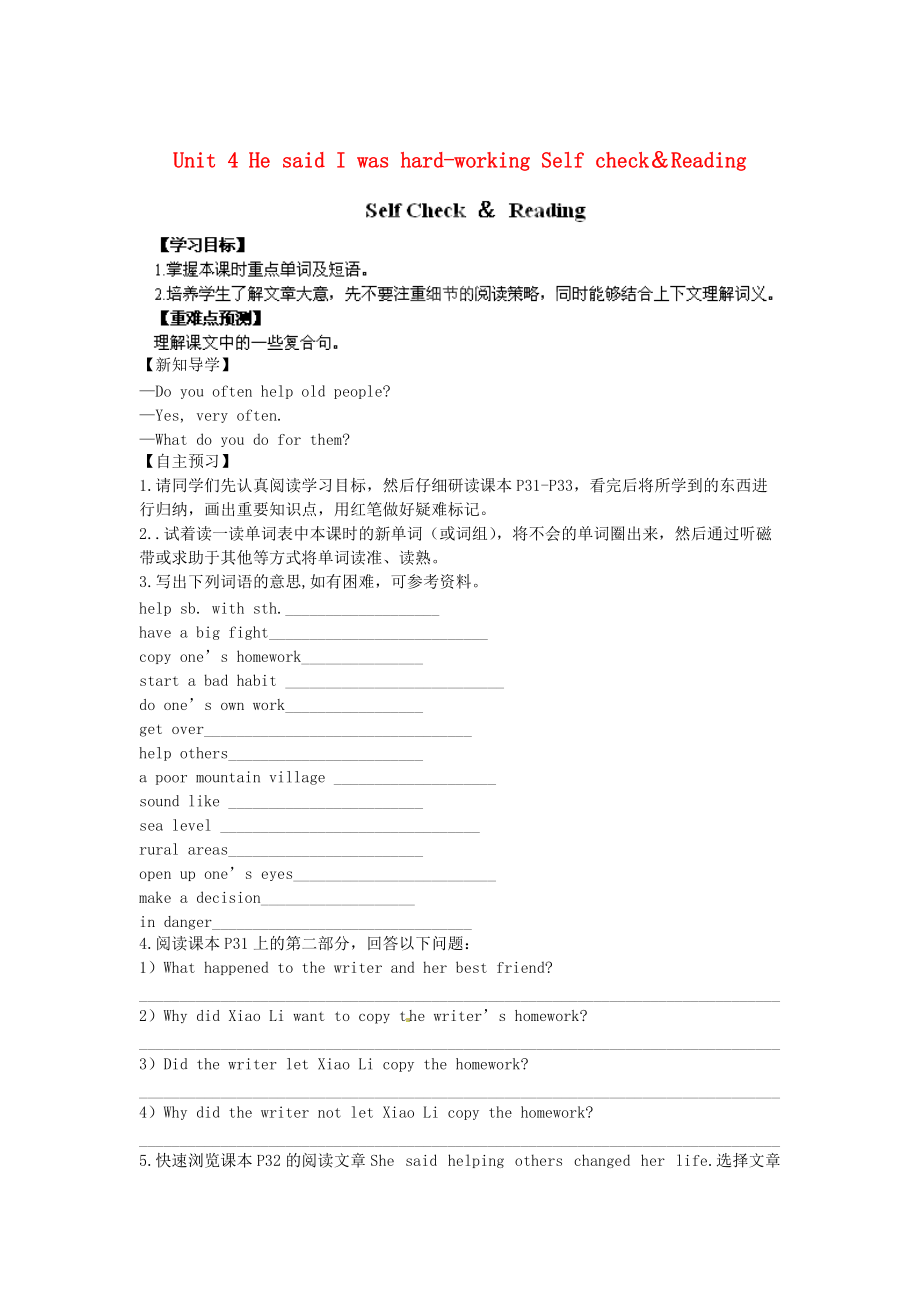《江西省八年級(jí)英語下冊(cè) Unit 4 He said I was hardworking Self check&Reading導(dǎo)學(xué)案 人教新目標(biāo)版》由會(huì)員分享����,可在線閱讀���,更多相關(guān)《江西省八年級(jí)英語下冊(cè) Unit 4 He said I was hardworking Self check&Reading導(dǎo)學(xué)案 人教新目標(biāo)版(3頁珍藏版)》請(qǐng)?jiān)谘b配圖網(wǎng)上搜索�����。
1����、 精品資料
Unit 4 He said I was hard-working Self check&Reading
【新知導(dǎo)學(xué)】
—Do you often help old people?
—Yes, very often.
—What do you do for them?
【自主預(yù)習(xí)】
1.請(qǐng)同學(xué)們先認(rèn)真閱讀學(xué)習(xí)目標(biāo)�����,然后仔細(xì)研讀課本P31-P33����,看完后將所學(xué)到的東西進(jìn)行歸納,畫出重要知識(shí)點(diǎn)���,用紅筆做好疑難標(biāo)記��。
2..試著讀一讀單詞表中本課時(shí)的新單詞(或詞組)��,將不會(huì)的單詞圈出來���,然后通過聽磁帶或求助于其他等方式
2、將單詞讀準(zhǔn)���、讀熟���。
3.寫出下列詞語的意思,如有困難,可參考資料�����。
help sb. with sth.___________________
have a big fight___________________________
copy one’s homework_______________
start a bad habit ___________________________
do one’s own work_________________
get over_________________________________
3�����、
help others________________________
a poor mountain village ____________________
sound like ________________________
sea level ________________________________
rural areas________________________
open up one’s eyes_________________________
make a decision_________________
4���、__
in danger________________________________
4.閱讀課本P31上的第二部分�,回答以下問題:
1)What happened to the writer and her best friend?
_______________________________________________________________________________
2)Why did Xiao Li want to copy the writer’s homework?
_________________________________
5�、______________________________________________
3)Did the writer let Xiao Li copy the homework?
_______________________________________________________________________________
4)Why did the writer not let Xiao Li copy the homework?
_________________________________________________________________
6���、______________
5.快速瀏覽課本P32的閱讀文章She said helping others changed her life.選擇文章中心內(nèi)容。(了解文章大意��,先不要注重細(xì)節(jié))
( ) A. The life in Yang Lei’s school was very hard.
B. Yang Lei enjoyed helping the students in a poor mountain village.
C. Yang Lei’s students liked her very much.
6.把以下單詞填入文章空白處��。(學(xué)會(huì)通過上下文猜測(cè)單詞意思)
7��、
a) world b) brothers c) changed d) agreed e) mountains f ) different
7. 精讀課文�,回答以下問題:
1. Where did Yang Lei work?
_______________________________________________________________________________
2. What did she eat?
___________________________________________________________________
8、____________
3. How do Yang Lei’s students study?
_______________________________________________________________________________
4. What did the children say about their volunteer teachers?
_______________________________________________________________________________
5. What did Yang Lei thi
9���、nk of her work?
_______________________________________________________________________________
【合作探究】
任務(wù)1:學(xué)完課文以后�,完成課文3a的表格���,比較一下你和楊蕾之間的生活����,然后在組內(nèi)交流����。
任務(wù)2:學(xué)完課文后,想必你對(duì)課文有了一個(gè)整體了解�����,試著去寫一寫這篇文章的摘要,字?jǐn)?shù)不超過100個(gè)�����。寫完后在組內(nèi)討論和交流�����,比一比看誰的文章能得到最佳好評(píng)����!
任務(wù)3:現(xiàn)在很多人都在從事自愿者活動(dòng)�����,你想?yún)⒓幽囊环N自愿者活動(dòng)呢�,給出你的理由,小組合作共同完成課文P33的第四部分���。完成任務(wù)所需要的語言結(jié)
10����、構(gòu):I would like to work for… because …
考點(diǎn)聚焦
volunteer的用法
1.作名詞,意為“志愿者”����。如:The schools in the west need a lot of volunteers.
2.作動(dòng)詞,表示“自愿�、主動(dòng)”,既可作及物動(dòng)詞���,也可作不及物動(dòng)詞���,后接動(dòng)詞不定式,構(gòu)成“volunteer to do sth.”�,如:He always volunteers to help others.
練一練:翻譯下列句子
1.我想在養(yǎng)老院當(dāng)一名志愿者。
_______________________________________
11����、________________________________________
2.他主動(dòng)告訴我這個(gè)消息。
_______________________________________________________________________________
◆start的用法
1.作名詞��,表示“開始���;開端”�����。如:We must make a new start.
2.作動(dòng)詞��,意為“開始�����;動(dòng)身����;出發(fā);創(chuàng)辦”��,作為開始相當(dāng)于“begin”��。如:
The boy started to learn English when he was five years old. 這個(gè)男孩
12��、五歲時(shí)開始學(xué)英語��。
The train starts at 9:00 am. 火車在上午九點(diǎn)鐘開出���。
His father starts a big company. 他的父親創(chuàng)辦了一個(gè)大公司。
練一練:選擇題
( ) The talk show will ______ at 10 o’clock. A. start B. ends C. open D. work
◆danger的用法
1.danger為名詞,意為“危險(xiǎn)”�,其反義詞為safety。詞組in danger指處于危險(xiǎn)之中。如:
If you are in danger, please call 110
13�����、 for help.
2.dangerous為形容詞�����,意為“危險(xiǎn)的”����,指對(duì)他人或事物構(gòu)成了危險(xiǎn)或威脅。如:It’s dangerous to play on the road.
【學(xué)案整理】
____________________________________________________________________________
____________________________________________________________________________
____________________________________________________________________________
____________________________________________________________________________
Self Check&Reading
練一練:1. I want to be a volunteer in the old people’s home.
2. He volunteered to tell me the news.
練一練:A
 江西省八年級(jí)英語下冊(cè) Unit 4 He said I was hardworking Self check&Reading導(dǎo)學(xué)案 人教新目標(biāo)版
江西省八年級(jí)英語下冊(cè) Unit 4 He said I was hardworking Self check&Reading導(dǎo)學(xué)案 人教新目標(biāo)版

